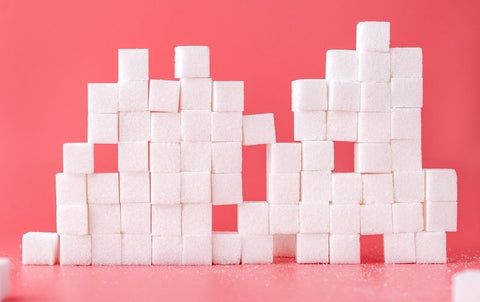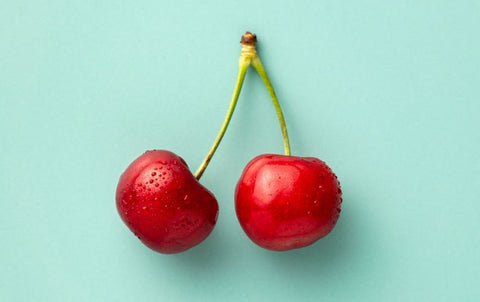Do you know about all the benefits of trying a sugar and grain-free diet? From increased energy to stronger immunity, and even better digestion, this lifestyle adjustment may help change the way you live (and feel).
Think about the last time you indulged your sweet tooth. You probably felt great while eating... But how about after?
We guess that you probably slipped into a carbs coma and felt lethargic and void of energy. (Maybe you even took a nap?)
There’s no denying how tasty warm baked goods and sugary treats are... However, there is a growing body of research that supports eliminating or significantly reducing your consumption of sugars and grains.
Not only do studies show that sugar and grain-free diets promote healthy weight loss, but people also reported improved energy levels, alertness, and focus.
So why are modern diets so high in foods that have little to health benefit, and, seem to bring a vast array of health consequences?
Let's find out.
How Our Diets Have Evolved
Our ancestors were hunter-gatherers and over hundreds of generations, they subsisted on a diet made up almost entirely of hunted animals and gathered vegetation.
Roughly 6,000 years ago, agricultural practices were becoming more commonplace, and sugarcane and various grains were domesticated. Agriculture quickly became a significant force in the evolution of human civilization.
Unfortunately, our bodies evolve much more slowly than societies. So, while a lot can happen to a city in 6,000 years, our genes and body systems have not changed very much.
Indeed, our dietary and health needs are very similar to those of our hunter-gatherer ancestors.
Even from a historical perspective, we can see that agricultural societies that processed sugars and grains for consumption suffered during the transition.
Moving from a diet rich in meat and vegetables to one dominated by grains, civilizations experienced reductions in lifespan as infant mortality and infectious disease rates increased.
Let's go over the consequences of a diet high in sugars and grains.
What Does Sugar Do to Your Body?
The explosion of carbohydrates in our food sources is the primary factor contributing to the unprecedented rates of chronic diseases in Western society, such as obesity and diabetes. Further, the health consequences of overindulging in refined sugars and grains are well documented.
Sugar impairs the activity of white blood cells, which subsequently affects immune system functioning. Limited storage capability for excess carbohydrates means your body converts carbs into body fat. It does this by using insulin, which is a hormone that functions to convert excess glucose in your blood (aka “blood sugar) into fat for storage.
This is a critical feature of our body machines because our ancestors often had to adapt to long periods without consistent access to food. For example, natural disasters could significantly limit their access to food from animals and vegetation. However, in today’s developed societies, access to food is a given.
We’re rarely faced with the prospect of starvation, and fat stores are less important for survival.
Unfortunately, snacking on processed sugars and grains leads to a spike in blood sugar followed by the secretion of insulin to store that sugar as fat for the future. With constant access to food, we never need to access our stored fat for survival.
As you can see, this presents a serious problem.
Why Sugar Consumption is at an All-Time High
Did you know that the average Canadian consumes about 26 tablespoons of sugar a day? ( *)
That’s a whole lot of sugar.
What’s even more alarming is that there are so many foods at the grocery store that appear to be healthy, but aren’t. These foods contain quite a bit of added sugar and may fool even the healthiest of us.
Here are a few examples of common foods that contain loads of sugar:
- Fruit juices (orange, apple, etc.)
- Cereal
- Canned Soups
- Ketchup
- Salad dressings
- Infant formula
These are just a few of the many foods that have unnecessary sugar added to them.
Keep this in mind while grocery shopping: most processed and packaged foods at the grocery store contain high amounts of added sugar.
So what’s the solution? You should consider switching to whole foods.
This means you need to learn how to make your own dressings, soups, and other meals from wholesome and fresh ingredients. By making food from scratch, you get to control what you put into your body and what stays out.
Starting a Sugar and Grain Free Diet
Okay, so now that you know the dangers of consuming too many sugars and grains, you're probably wondering what to do next. So, to help you out, we have put together a few tips to help you get started with your sugar and grain-free diet.
Just a friendly warning, it will be hard to cut these out (especially if you consume them regularly), but the health benefits will be well worth it.
Important Note: It's always best to consult with a doctor or dietitian before making any major changes to your diet.
1. Limit Processed Food
Sugar is easily hidden in many processed foods like ketchup, spaghetti sauce, and salad dressings. Read food labels and choose “no added sugar” or “all fruit” products.
2. Avoid Soda
We all know that soda has lots of sugar. This sugar acts as empty calories that the body does not easily recognize and, in turn, makes you unnecessarily hungry. Moreover, soda contains phosphoric acid, which depletes calcium and magnesium in the body.
3. Exercise
By exercising, you can reduce food cravings for sugar and also reduce insulin levels after exercise.
4. Sweeten Naturally
Do you find yourself reaching for sugar to add flavour to your food and drinks? You can replace white sugar with alternatives like:
- Honey
- Apple sauce
- And Stevia
Stevia comes from a plant and has no calories. Plus, it’s 200 times sweeter than sugar in the same concentration. You can even use these alternative sweeteners while baking.
5. Choose Whole Grains
Whole grains, or complex carbohydrates, make our bodies work hard and use energy in the process. At the same time, the process of breaking them down takes a long time. This results in sugar molecules entering the bloodstream slowly.
Simple ways you can switch to complex carbs include:
- Switching white rice to wild rice or brown rice
- Choosing whole grain pasta
- Buying whole grain bread
- Shaking things up with other grain options, like quinoa
Closing Thoughts
There are many ways that you can cut sugar out of your diet. It will take patience, commitment, and being more involved in what you are putting into your body – but you can do it.
To make it easy on yourself, take small steps. Begin with cutting added sugars out of your diet for one day and then build up to one week, one month, etc.
Additionally, the next time you go grocery shopping, try swapping out a few of the common packaged foods for their wholesome, raw ingredients. (It might even be fun to learn a recipe or two along the way.)
Though this will be challenging at first, eventually, your body will stop craving sugar. And you will begin to have more energy, better health, and a sense of pride in your accomplishment.
Finally, leave a comment below letting us know if you have tried a sugar and grain free diet before. Share your experience and tips with us!





